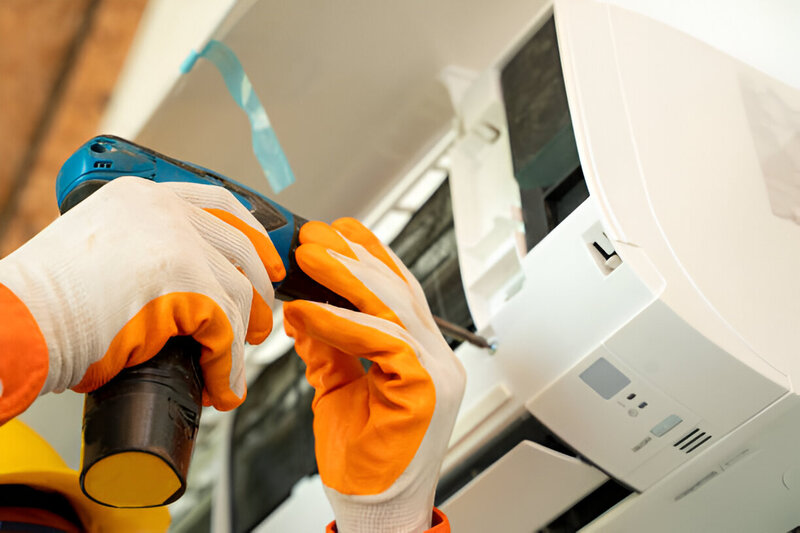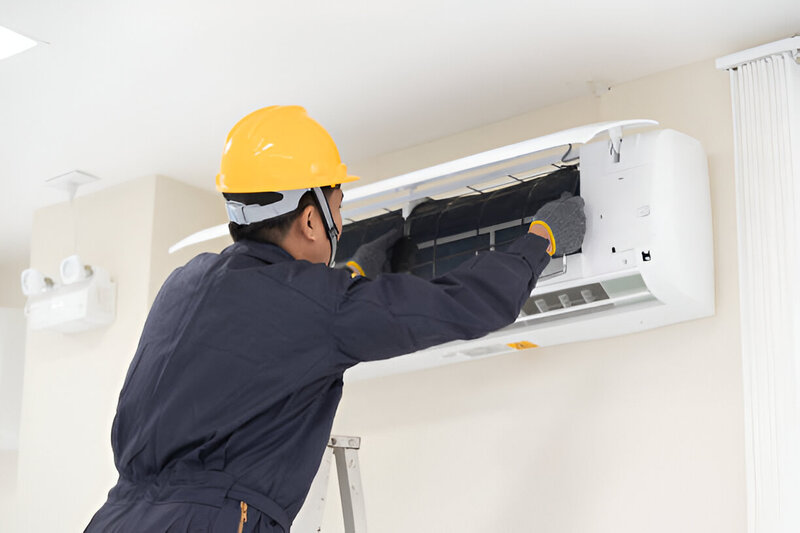Who among us doesn’t look forward to that blast of cool, refreshing air when stepping inside from a sweltering summer’s day? But have you ever paused to consider what’s happening behind the scenes to create this in-home oasis? Or how it affects our health and indoor air quality? We rely enormously on-air conditioning systems to keep our homes comfortable, but we often overlook the vital role these systems play in maintaining indoor air quality.
Air conditioning services are more than simple temperature control—they are an integral part of maintaining a healthy, enjoyable living environment. When properly maintained, an air conditioning system can contribute to improved air quality, ultimately impacting your health and general well-being. This indispensable household appliance just may be a hidden warrior in the fight against allergens, pollutants, and pathogens!
In this blog post, we’ll delve into the manifold ways in which air conditioning services impact our indoor air quality, and what that means for you and your loved ones. Strap in and prepare for some game-changing insights!
What Exactly Does Your Air Conditioner Do?
In simple terms, an air conditioner does more than just cool the air; it conditions it. This process involves removing heat and moisture, which can be perceived as soothing on a hot day. But there’s more at play here. A well-functioning air conditioner also filters out particulates and pollutants, providing cleaner, healthier indoor air.
Moreover, a well-maintained air conditioner helps regulate humidity levels within your home. Excessive humidity can accelerate the growth of mould, bacteria, and dust mites—three nuisances known to exacerbate allergies and respiratory conditions. By controlling humidity, your air conditioner is an unexpected ally in maintaining a healthier living environment.
The Importance of Indoor Air Quality
Indoor air quality (IAQ) refers to the condition of the air inside your home and how it affects your health and comfort. Poor indoor air quality can lead to various health issues, including respiratory problems, allergies, and even chronic illnesses. It’s estimated that people spend about 90% of their time indoors, making it crucial to ensure that the air we breathe is clean and safe.
An air conditioning system that is not properly maintained can negatively impact indoor air quality, circulating dust, allergens, and other pollutants throughout your living space. Regular servicing can mitigate these risks, ensuring that your air conditioner continues to function optimally while improving your home’s overall air quality.
How Does Your AC Affect Indoor Air Quality?

When functioning at peak efficiency, your air-conditioning system can effectively filter out a host of airborne particles, such as dust, pet dander, and spores from your home. But if your system is not regularly serviced and filters become clogged, these particles can circulate in the air, impacting indoor air quality.
The Consequences of Neglect
Neglecting your air conditioning unit can have dire consequences for your indoor environment. Dust and allergens can build up in your system, leading to poor air quality and potentially making you and your family sick. The following are some signs of poor indoor air quality:
- Respiratory Issues: Poor air quality can aggravate asthma and other respiratory problems.
- Allergies: Increased levels of dust and pollen can lead to allergy flare-ups.
- Fatigue and Headaches: Stale air can cause feelings of fatigue and can trigger headaches.
- Mould Growth: A poorly maintained air conditioner may lead to increased humidity, encouraging mould growth.
The Role of Filters
In a business environment, the air filters in your air conditioning system play a crucial role in maintaining indoor air quality. They capture dust, dirt, and other particulates, preventing them from circulating throughout the workspace. Regularly replacing or cleaning the filters can greatly enhance air quality, creating a healthier environment for employees and clients. Ideally, filters should be checked monthly and replaced every three months, or more often if the business involves pets, machinery, or is located in a dust-prone area.
The Importance of Regular Air Conditioning Services
You wouldn’t drive your car around for years without getting it serviced, would you? Similarly, regular air conditioning service and maintenance are crucial for ensuring the unit is functioning at an optimal level, providing not just cooling, but superior air purification.
What Does Regular Maintenance Involve?
Air conditioning services typically include the following:
- Cleaning or Replacing Filters: Ensuring filters are clean can enhance air flow and improve air quality.
- Inspecting Ducts: Clean and unobstructed ducts help maintain efficient airflow and minimize dust circulation.
- Checking Refrigerant Levels: Proper refrigerant levels are required for effective cooling.
- Cleaning Coils: Dirty coils can hinder the cooling process, reducing efficiency and air quality.
Regular servicing can prolong the lifespan of your air conditioning unit while ensuring that it continues to provide clean, purified air. Think of it as an annual health check-up for your air conditioner!
How to Improve Your Indoor Air Quality
Beyond investing in regular air conditioning services, there are other steps you can take to improve indoor air quality. Here are some practical tips:
Integrate House Plants
Certain house plants act as natural air purifiers, absorbing pollutants and releasing fresh oxygen. Plants like spider plants, peace lilies, and snake plants can help reduce indoor air toxins while adding beauty to your home.
Let Fresh Air In
Opening your windows for just a few minutes daily can significantly improve air quality. Fresh air can help dilute indoor pollutants, making your living space feel more inviting and breathable.
Avoid Storing Chemicals Indoors
Fumes from household cleaners, paints, and solvents can drastically influence your home’s air quality. Whenever possible, store these items outside or in well-ventilated areas. Opt for natural cleaning products that are less harmful to your indoor environment.
The Too-Hot House Dilemma: The Unforeseen Costs
Yes, an over-reliance on air conditioning has an environmental impact. However, the health costs of living in an overheated house can be just as detrimental. Dehydration, lethargy, and a tendency for heat-induced illnesses increase in a too-hot house, not to mention the negative impact on sleep and comfort.
The Importance of Temperature Regulation
Proper temperature regulation is essential for maintaining comfort and preventing health issues. A well-maintained air conditioning system can help you avoid overheating, ensuring that your indoor environment remains cool and pleasant.
Pros and Cons of Using an Air Conditioner
Air conditioners can undoubtedly improve living spaces, filtering out pollutants and controlling humidity. However, they should be used wisely. Over-reliance can lead to higher energy costs and an increased carbon footprint. It’s all about finding a balance—maximizing the health advantages while minimizing the environmental impact.
Understanding the Costs
When considering the pros and cons, it’s crucial to understand the associated costs of running an air conditioning unit. While they provide essential comfort, they can also lead to increased energy bills and maintenance costs. However, regular servicing can help mitigate these expenses by improving energy efficiency and extending the lifespan of the unit.
Conclusion
Maintaining your air conditioning system is essential for ensuring not only a comfortable indoor environment but also improved air quality and overall health. Regular servicing and proper care allow your air conditioner to effectively filter out pollutants, control humidity levels, and promote a healthier living space. By prioritizing the maintenance of your HVAC system, you empower yourself to create a safe and inviting atmosphere for you and your loved ones, while also reducing potential health risks associated with poor indoor air quality. Embracing this responsibility is a crucial step towards fostering a sustainable and enjoyable home environment.
